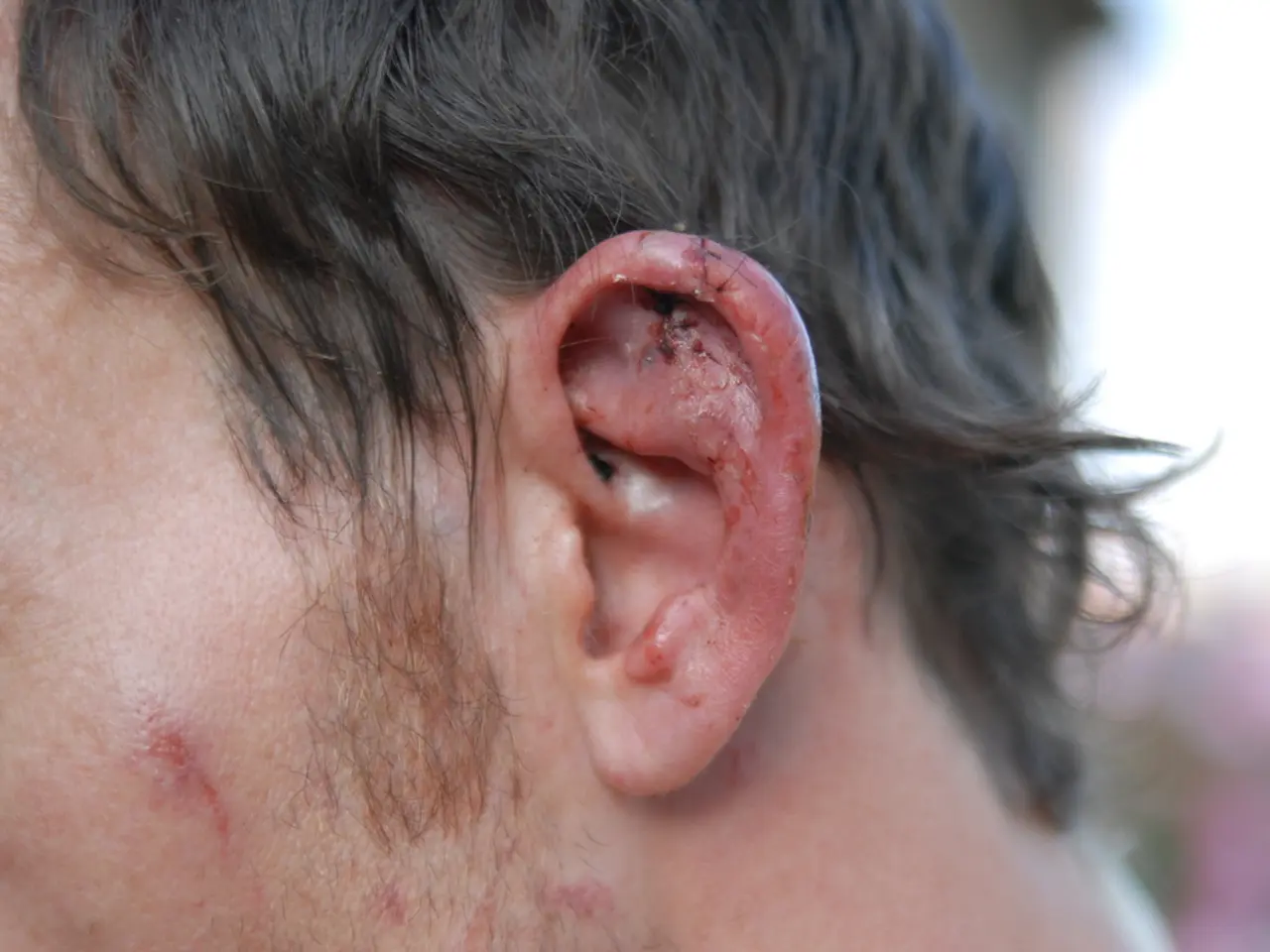Odor associated with menstruation: Essential information you should be aware of
A **fishy or rotten smell** in period blood is often a sign of **bacterial vaginosis (BV)**, an imbalance of the normal vaginal bacteria. This condition occurs when the levels of "good" bacteria (lactobacilli) decrease, allowing "bad" bacteria such as Gardnerella vaginalis and others to overgrow[1][3]. This leads to a thin, grayish or yellowish discharge with a strong fishy odor, which can become more noticeable during menstruation as the vaginal pH becomes less acidic and more conducive to bacterial growth.
Other factors that can contribute to stronger or unpleasant odors during menstruation include not changing tampons or pads frequently, dietary factors such as high-fat, sugar, processed foods, or strong-smelling foods like garlic, dehydration, hormonal fluctuations, use of antibiotics or hormonal birth control, smoking, and stress[1]. Retained menstrual products can also cause a foul smell due to bacterial growth on the retained blood.
In some cases, a healthcare professional's guidance is essential. If a fishy odor is detected, it's crucial to seek an accurate diagnosis as it can indicate BV or other infections. If an infection such as bacterial vaginosis is confirmed, antibiotics prescribed by a healthcare provider are the primary treatment to restore bacterial balance and eliminate odor-causing bacteria[2][3].
Maintaining good menstrual hygiene, such as changing period products regularly and practicing proper cleaning, can prevent odor and infections. Staying well-hydrated and eating a healthy diet low in processed foods may reduce the risk of BV and associated odors.
It's important to note that body odor during menstruation is due to the presence of apocrine sweat glands in the genital region. A metallic smell in period blood is common and is typically due to the presence of iron in the blood. A person might have white or gray vaginal discharge outside of menstruation.
The use of feminine hygiene deodorants or other products can irritate the vaginal area, and doctors do not recommend douching. Trichomoniasis, a sexually transmitted infection, can pass from one person to another through sex and can cause a fishy odor, changes in vaginal discharge, itching, burning, or soreness in the genital area[2].
If a person notices a change in smell during their period or in their vaginal discharge in between periods, experiences severe pelvic or stomach pain, bleeding heavier than usual, or a fever, it's best to contact a doctor. Pregnant individuals should speak to a doctor if they notice unusual changes in vaginal discharge, strange odors, or vaginal bleeding during pregnancy.
In summary, understanding and managing unpleasant odors during menstruation involves maintaining good menstrual hygiene, eating a healthy diet, staying hydrated, and seeking medical advice when necessary. Prompt medical consultation is advised to rule out infections or complications.
References: [1] American College of Obstetricians and Gynecologists (2019). Bacterial Vaginosis. Retrieved from https://www.acog.org/patients/faqs/bacterial-vaginosis [2] Mayo Clinic (2021). Trichomoniasis. Retrieved from https://www.mayoclinic.org/diseases-conditions/trichomoniasis/symptoms-causes/syc-20356744 [3] Centers for Disease Control and Prevention (2021). Bacterial Vaginosis (BV). Retrieved from https://www.cdc.gov/std/bv/stdfact-bv.htm
- Bacterial vaginosis (BV), characterized by a fishy or rotten smell, is often a sign of an imbalance in vaginal bacteria, specifically a decrease in lactobacilli and an overgrowth of Gardnerella vaginalis.
- This imbalance leads to a thin, grayish or yellowish discharge with a strong fishy odor, which can become more noticeable during menstruation.
- Factors like infrequent changing of tampons or pads, dietary factors, dehydration, hormonal fluctuations, use of antibiotics or hormonal birth control, smoking, stress, and retained menstrual products can contribute to stronger or unpleasant odors during menstruation.
- A healthcare professional's guidance may be essential for a proper diagnosis, as a fishy odor can indicate BV or other infections.
- Antibiotics, prescribed by a healthcare provider, are the primary treatment to restore bacterial balance and eliminate odor-causing bacteria if BV is confirmed.
- Maintaining good menstrual hygiene, such as regular changing of period products and proper cleaning, can prevent odor and infections.
- Eating a healthy diet low in processed foods and staying well-hydrated may reduce the risk of BV and associated odors.
- Apocrine sweat glands in the genital region cause the body odor during menstruation, and a metallic smell in period blood is common due to the presence of iron.
- The use of feminine hygiene deodorants or other products can irritate the vaginal area, and doctors do not recommend douching.
- Trichomoniasis, a sexually transmitted infection, can cause a fishy odor, changes in vaginal discharge, itching, burning, or soreness in the genital area.
- If a person notices a change in smell during their period or in their vaginal discharge in between periods, experiences severe pelvic or stomach pain, bleeding heavier than usual, or a fever, they should contact a doctor.
- Pregnant individuals should speak to a doctor if they notice unusual changes in vaginal discharge, strange odors, or vaginal bleeding during pregnancy.
- To manage unpleasant odors during menstruation, it's essential to maintain good menstrual hygiene, eat a healthy diet, stay hydrated, and seek medical advice when necessary to rule out infections or complications.




